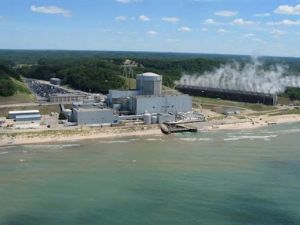Just as Holtec International has hit a potentially significant pothole in its road to restart the moribund Palisades nuclear plant in Michigan, Constellation Energy says it has a deal to restart its shuttered Three Mile Island Unit 1 in Pennsylvania.
Is this a trend, or just a limited instance of life after nuclear death? There’s no answer to this question, although the most likely scenario is that the possibilities of a Lazarus movement in nuclear power are slim.

At Palisades, which has kicked off the interest in bringing back comatose nuclear plants. Nuclear Regulatory Commission and Holtec inspectors have found what the agency describes as “a large number of steam generator tubes with indications that require further analysis and/or repair.”
The company said, “Most recently, we have completed detailed inspections of the plant’s steam generators. During these inspections, the need for additional maintenance activities was identified. Thorough and early inspections have allowed us to proactively identify and implement the needed refurbishments before Palisades returns to service. Palisades’s owner’s engineer, Nuclear Consultants International (NCI, an autonomous Holtec affiliate), is working with experienced on-site and external experts to devise and implement industry-proven solutions.”
The 43-year-old Palisades reactor is a two-loop Combustion Engineering pressurized water reactor, with generating capacity of 805-MW. The plant has been out of service since May 2022. Holtec bought it from Entergy a month later, with the announced plan to decommission it. But many who follow nuclear power believe that Holtec intended to attempt a restart from the start. With $1.5 billion in federal support, Holtec hopes to have the plant running again by the end of next year.
Just how significant is the steam generator problem? A Holtec spokesman told Reuters the company “doesn’t expect anything significant time wise” and any extra costs “would be within our scope as we planned conservatively.” Contradicting that, the news service reported, “Alan Blind, engineering director at the plant from 2006 to 2013, estimated on Wednesday that repairs to the steam generators would cost over $500 million and add two to three years to any restart.”
Edwin Lyman, the nuclear safety director at the Union of Concerned Scientists, called for more details about the steam generator issue. “The public deserves the unvarnished truth … before more taxpayer and ratepayer dollars are poured down what could be a very deep rathole,” he said.
Moving to Harrisburg, Pa., Constellation said it has a deal with Microsoft Corp. for a 20-year, fixed-price power purchase agreement that hinges on restart of 835-MW Three Mile Island 1. Microsoft would purchase all of the plant’s production. The plant shut down Sept. 20, 2019 because it was unable to compete in the PJM capacity market.

The Babcock & Wilcox pressurized water reactor began service in 1974. It sits next to TMI 2, which went into service on Dec. 30, 1978 and melted down in a loss of coolant accident on March 29, 1979. Baltimore-based Constellation is the nation’s largest nuclear power plant operator, with plants in Illinois, Pennsylvania, Maryland, New York, New Jersey, and Texas.
In a news release, the company said, “Under the agreement, Microsoft will purchase energy from the renewed plant as part of its goal to help match the power its data centers in PJM use with carbon-free energy.” Constellation provided few details about the Microsoft contract, which is contingent on the plant getting NRC approval to restart. Utility Dive reported that “there are no plans to colocate a Microsoft data center at the plant.”
Until the details of the unconventional deal are revealed — and they will be — it isn’t clear what regulatory path it will face. In addition to the NRC, the Microsoft-Constellation arrangement could face reviews by Treasury, the Pennsylvania Public Utilities Commission, the PJM Interconnection, and possibly the Federal Energy Regulatory Commission.
In a presentation to investors last week (Sept. 20), Constellation said it will spend some $1.6 billion to recommission the plant and will qualify for the federal 45Y clean energy production tax credit that is part of the 2022 Inflation Reduction Act. Constellation hopes to have the plant in service in 2028. Constellation says it also plans to file for an NRC license extension through 2054.
Although the details of the deal are not yet public, the initial announcement has raised some skeptical eyebrows. Henry Sokolski of the Nonproliferation Policy Education Center in Arlington, Va., commented on Twitter, “A new model for nuclear power’s expansion: Microsoft wants to buy all of Three Mile Island’s electricity but expects rate and taxpayers to cover the $1.6 b cost of refurbishing the plant.”
TMI could pose some problems as the plant has not operated for five years, while Palisades was shut down only for a short time when Holtec stepped in. Constellation says it has been working for a year in advance of the unveiling of the Microsoft contract on recommissioning readiness. Among other items, the utility says it has inspected the steam generators, the main steam turbine generator, and the main power transformer; begun buying materials for the main transformer and “long lead materials; and started the process for buying reactor fuel.
Could the potential rebirths of Palisades and TMI 1 be harbingers of other nuclear recommissioning projects? Probably not, according to Timothy Fox of ClearView Energy Partners LLC. Fox told Reuters, “We’re not convinced there are a lot of viable candidates.” ClearView is a Washington-based independent energy research firm.
The only other publicly-identified candidate for resurrection is Iowa’s Duane Arnold plant, a 600-MW General Electric boiling water reactor, which went into service in 1975 and closed in 2020. It is owned by NextEra Energy Resources.
In July, Bloomberg reported that the demand for massive amounts of power for hypothetical new data centers has led NextEra to consider restarting the Duane Arnold, which shut down in 2020 after its biggest customer opted to exit its power-purchase agreement. John Ketchum, CEO of Florida-based NextEra, told Bloomberg, “I would consider it, if it could be done safely and on budget.”
Duane Arnold has one particular problem that could be a show-stopper. NextEra announced it would close the plant in 2020 after Alliant Energy, which was purchasing 70% of the plant’s output, switched to less expensive power from natural gas and renewables. A key element to the decision was the need to make repairs to the plant’s closed-cycle cooling towers after an August 2020 derecho (violent windstorm) hit the region. The company issued a statement, saying, “The strong storms that hit the area on 10 August caused extensive damage to Duane Arnold’s cooling towers, and our evaluation found that replacing those towers before the site’s previously-scheduled decommissioning on 30 October 2020, was not feasible.”
–Kennedy Maize
kenmaize@gmail.com
The Quad Report




